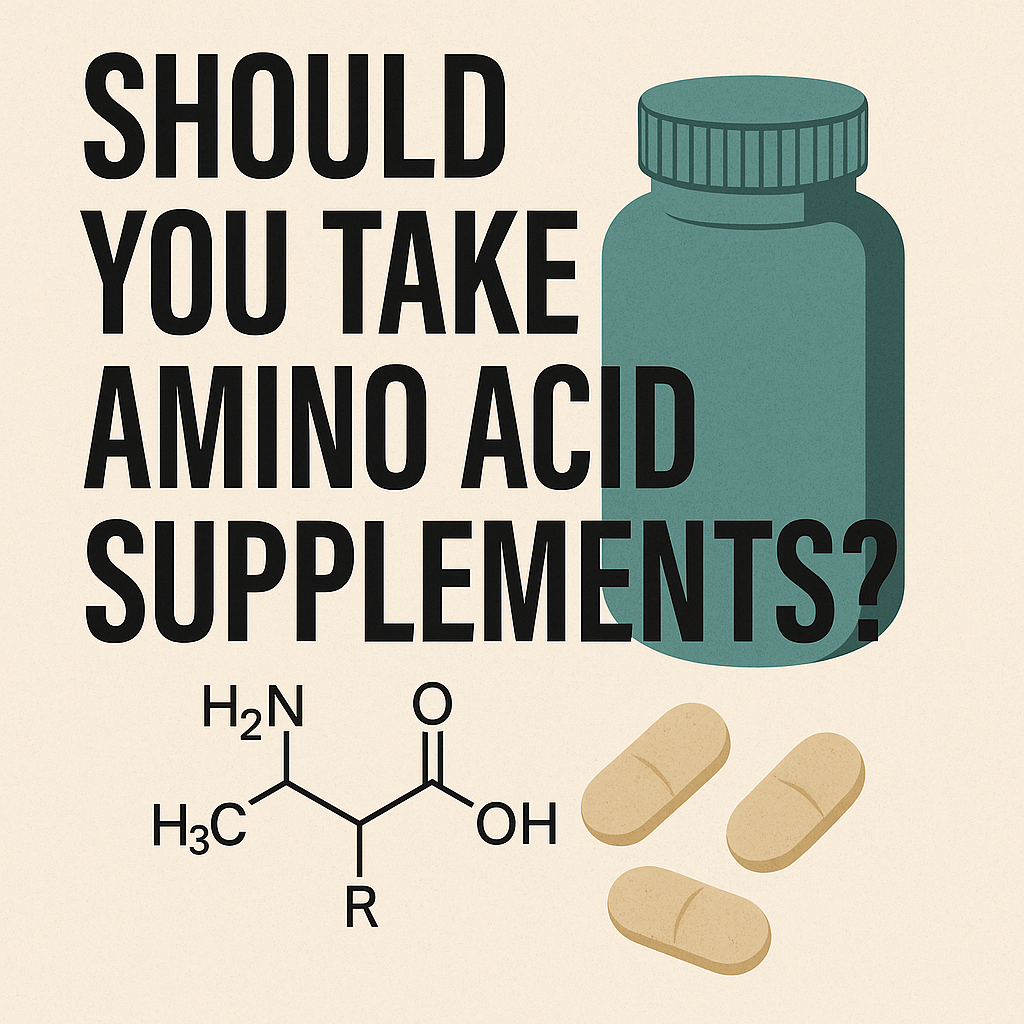Amino acid supplements have been gaining traction among athletes, older adults, and wellness seekers aiming to boost performance, build muscle, or improve recovery. But are these supplements truly necessary — or just a trend? In this comprehensive guide, we’ll explore what amino acids are, who may benefit from supplementation, the potential risks involved, and how to choose a quality product. If you’re considering amino acid supplements as part of your wellness or fitness regimen, this article is for you.

Table of Contents
- What Are Amino Acids?
- Who Should Consider Supplementing?
- Key Benefits of Amino Acid Supplements
- Risks and Side Effects
- How to Choose a Quality Amino Acid Supplement
- Expert Recommendations
- Conclusion
What Are Amino Acids?
Amino acids are often referred to as the building blocks of protein. Your body uses them for a wide range of essential functions including muscle development, tissue repair, enzyme production, and hormone regulation. There are 20 amino acids in total, nine of which are considered “essential.” This means your body cannot produce them on its own—you need to obtain them through food or supplements.
The essential amino acids include:
- Leucine
- Isoleucine
- Valine
- Lysine
- Threonine
- Phenylalanine
- Methionine
- Histidine
- Tryptophan
Branched-chain amino acids (BCAAs) — leucine, isoleucine, and valine — are particularly popular in fitness circles due to their role in muscle recovery and growth.
Who Should Consider Supplementing?
For most people, a balanced diet provides adequate amino acids. However, certain populations may benefit from additional supplementation:
1. Older Adults
As we age, our muscle mass naturally declines—a condition known as sarcopenia. This can lead to decreased mobility, increased fall risk, and lower quality of life. Research suggests that leucine-enriched amino acid supplements can help older adults maintain muscle mass and strength.
2. Athletes and Active Individuals
Those who engage in regular or intense physical activity may benefit from amino acid supplements to support muscle repair, reduce soreness, and improve recovery times. BCAAs are especially helpful in minimizing muscle breakdown during and after workouts.
3. People With Limited Protein Intake
Vegans, vegetarians, and those on calorie-restricted diets may struggle to consume enough complete proteins. Amino acid supplements can help fill these nutritional gaps, especially if plant-based diets lack certain essential amino acids.
4. Individuals Recovering from Surgery or Illness
Increased protein demand during recovery makes amino acids valuable for post-surgical healing or recovery from illness or injury. They can aid in tissue repair and immune function support.
Key Benefits of Amino Acid Supplements
Here are some well-documented benefits of taking amino acid supplements when used correctly:
- Muscle Preservation: Prevents muscle wasting in aging individuals and during calorie restriction.
- Improved Recovery: Reduces muscle soreness and speeds up recovery after intense exercise.
- Enhanced Performance: Supports endurance and strength in athletic training.
- Weight Management: Aids fat loss while preserving lean muscle mass.
- Brain Function: Certain amino acids, such as tryptophan and phenylalanine, play a role in neurotransmitter production.
Risks and Side Effects
While amino acid supplements are generally safe for healthy individuals, overuse or misuse can lead to complications. Common side effects include:
- Nausea or upset stomach
- Bloating and cramps
- Diarrhea
- Headaches
- Fatigue or dehydration (especially with high doses of BCAAs)
More serious risks are rare but can occur, especially in people with underlying health conditions like liver or kidney disease. If you’re diabetic, pregnant, or taking medications, consult your healthcare provider before supplementing.
How to Choose a Quality Amino Acid Supplement
Not all supplements are created equal. Since the FDA does not strictly regulate dietary supplements, quality control can vary widely. Here are tips to ensure you’re choosing a safe, effective product:
- Third-party tested: Look for products tested by organizations like NSF, Informed Choice, or USP.
- Ingredient transparency: Avoid proprietary blends that don’t disclose exact dosages.
- No unnecessary additives: Steer clear of artificial sweeteners, colors, or fillers.
- Form: Choose between powder, capsule, or liquid based on your convenience and dietary preferences.
Expert Recommendations
Here’s what health professionals suggest when it comes to amino acid supplements:
“Most healthy adults get all the amino acids they need from a balanced diet rich in protein. However, there are specific scenarios — like athletic training, aging, or recovery — where supplementation might help,” says Dr. Carolyn Williams, registered dietitian and author of *Meals That Heal*.
Nutritionists also stress the importance of using supplements *as an addition*, not a replacement, to a whole-food diet. The synergy of nutrients found in real food can’t be matched by isolated compounds in a pill or powder.
Conclusion
Amino acid supplements can be a valuable tool for certain individuals — especially older adults, athletes, or those with dietary restrictions. They offer benefits ranging from muscle preservation to enhanced recovery and improved brain function. However, they’re not universally necessary. Overuse can lead to side effects, and not all products on the market meet safety standards.
To make an informed choice, consult with your doctor, focus on a protein-rich diet, and choose a third-party tested supplement if needed. Remember, the best foundation for health is still a balanced diet and lifestyle.
